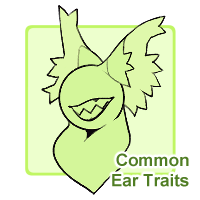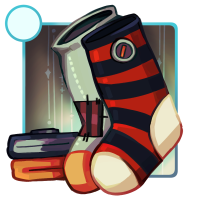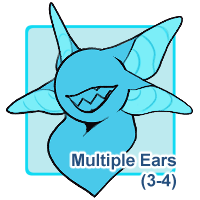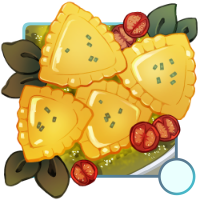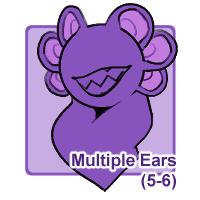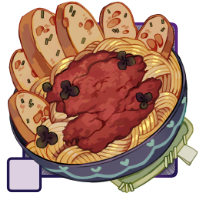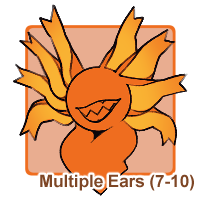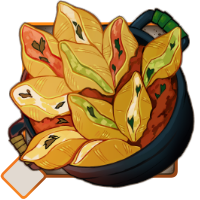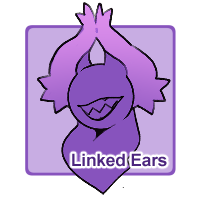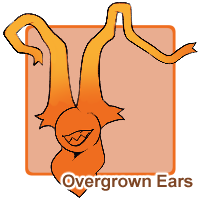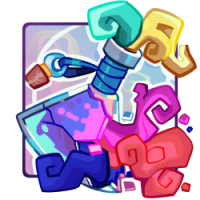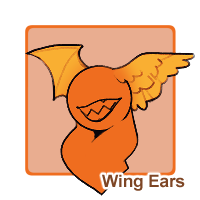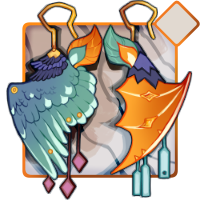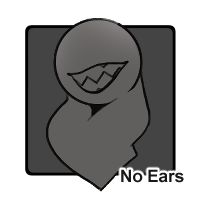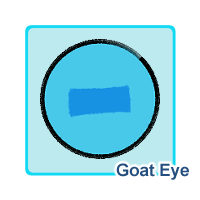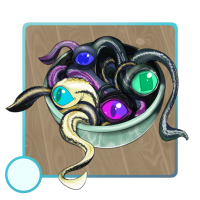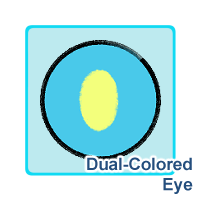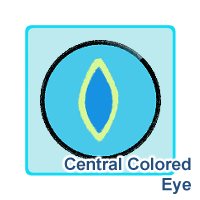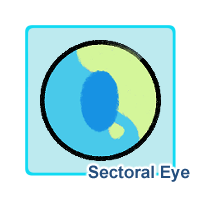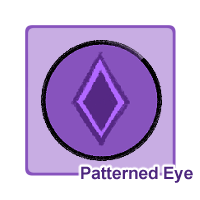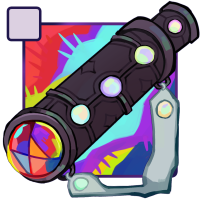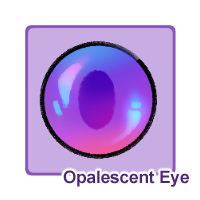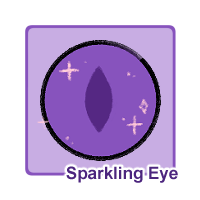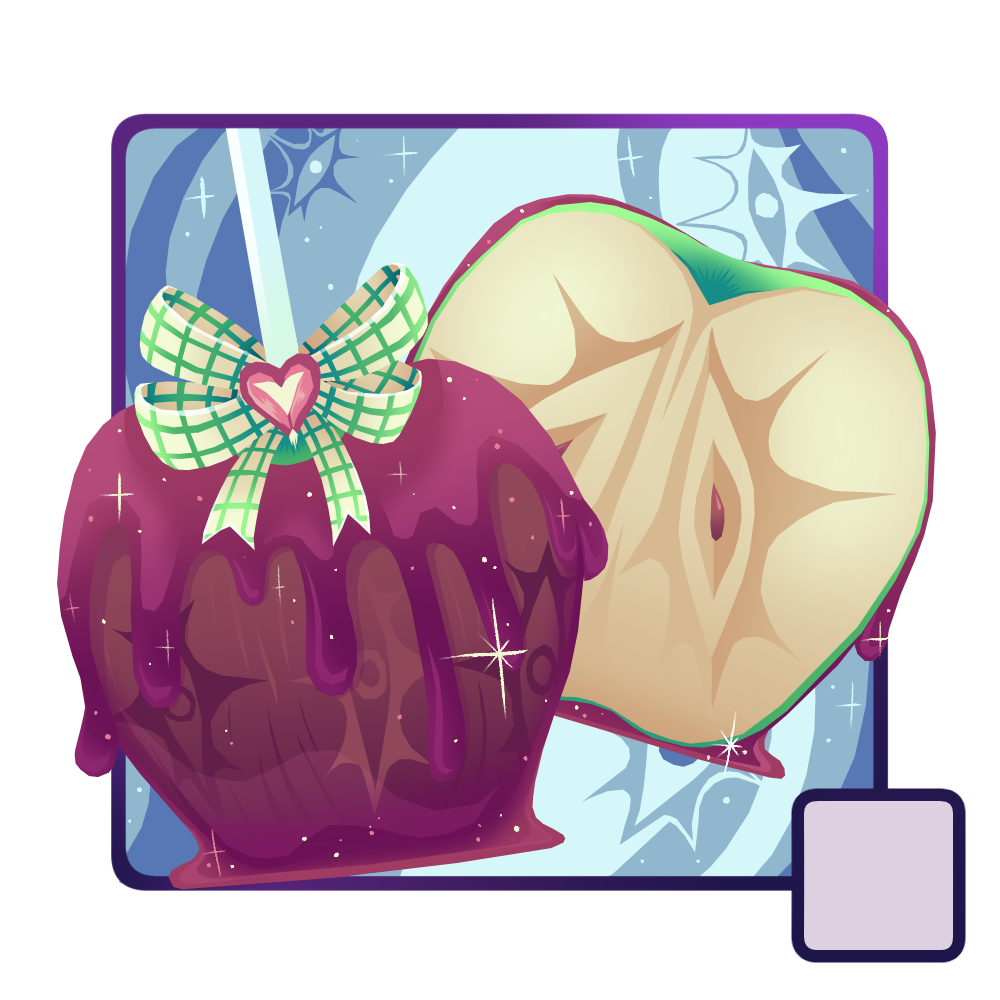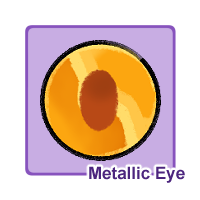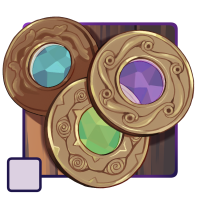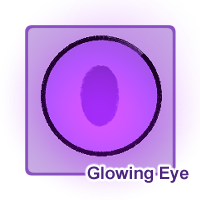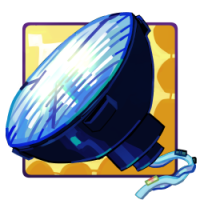Traits
[ Click here for Visual Sorter! ]
Common Ears (CCCats) (Common)
[This includes all Common Traits for CCCat Ears. They do NOT need to be listed at all when uploading a design, and are strictly informational. You may use as many as you’d like while designing a MYO]
- Fluffy Ears
- Furless Ears
- Bent Ears
- Oddly Shaped Ears - [Ears may have odd shapes, holes, and different lengths. Odd ear shapes must clearly be part of the ear]
- Mismatched Ears - [Ears may be asymmetrical]

Droopy Ears (CCCats) (Uncommon)
[Ears that dangle downwards]
- Ears flop over at the base
- Ear themselves can be floppy and soft
- Ears may point downward without this trait
- Button ears do not require the use of this trait, as it only affects the base.
Can be applied by:
Multiple Ears (3-4) (CCCats) (Uncommon)
[3 to 4 ears placed on the head]
- Can be placed symmetrically or asymmetrically
- Cannot be placed anywhere that an ear would not naturally be, but can go to a degree down the jaw/head to account for multiple ears
Can be applied by:
Multiple Ears (5-6) (CCCats) (Rare)
[5 to 6 ears placed on the head]
- Can be placed symmetrically or asymmetrically
- Cannot be placed anywhere that an ear would not naturally be, but can go to a degree down the jaw/head to account for multiple ears
Can be applied by:
Multiple Ears (7-10) (CCCats) (Myth)
[7 to 10 ears placed on the head]
- Can be placed symmetrically or asymmetrically
- Cannot be placed anywhere that an ear would not naturally be, but can go to a degree down the jaw/head to account for multiple ears
Can be applied by:
Linked Ears (CCCats) (Rare)
[Ears that are merged together above the base]
- Can be linked by strips or at different points in the ear's shape
- Cannot be merged at the base
Can be applied by:
Overgrown Ears (Myth)
[Ears that are very clearly larger than are proportional to the character]
- Can affect one part of the ear or the entire ear
Can be applied by:
Wing Ears (CCCats) (Myth)
[Ears are replaced with or heavily resemble wings]
- Wing Ears can be bat ears, feathered ears, or a mix of them both
- Grants Levitation magic.
- Can articulate, bend, and fold up.
- Effects all ears
- Cannot be placed anywhere that would be unusual for ears (no ears on the back of head, under the jaw, on the neck, etc.)
Can be applied by:
No Ears (CCCats) (Lore Breaking)
[The CCCat has no ears]
- This trait cannot be used and must be updated if redesigned
Common Eye (CCCats) (Common)
[This includes all Common Traits for CCCat Eyes. They do NOT need to be listed at all when uploading a design, and are strictly informational. You may use as many as you’d like while designing a MYO]
- Saturated/Living Eye - [Eye is bright and saturated with a pupil of the same but slightly darker color. This color range implies a living CCCat. Standard Eye cannot dip below 43% Saturation and Value on an HSV/B scale. Please submit a flat and unshaded eye reference when submitting a MYO or Redesign. Please refrain from adding lineart to the pupil]
- Slit Pupil - [Pupils are able to dilate but must retain their base shape]
- Round Pupil - [Pupils are able to dilate but must retain their base shape]

Square Pupil (Uncommon)
[Any diamond, rectangular, square or goat shaped pupil]
- Pupil is goatlike, square, rectangular or diamond shaped. Can be soft or hard edged
- Pupil may be naturally horizontal in alignment
- This trait is not needed if Patterned Eye is used
- CCCATS - A CCCat’s eye must be above 43% saturation and value to be considered a living eye. Please provide a flat and unshaded eye reference when submitting a MYO or Redesign (MYO and Redesign Guide)
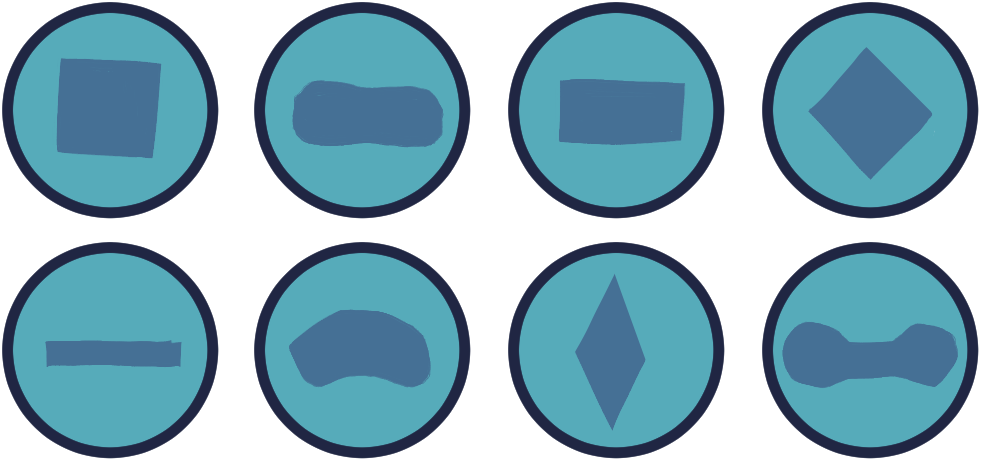
Can be applied by:
Dual-Colored Eye (Uncommon)
[Eye that has a differing hue between the pupil and base color]
- Hue is clearly different from the base color
- Includes if the pupil is lighter than the base of the eye
- To have a colored pupil on a Dead Eye, this trait is required
- CCCATS - A CCCat’s eye must be above 43% saturation and value to be considered a living eye. Please provide a flat and unshaded eye reference when submitting a MYO or Redesign (MYO and Redesign Guide)
Can be applied by:
Split Pupil (Uncommon)
[The pupil appears as though it is incompletely split in two but connected at the sides/midpoint]
- Can be applied to split or round pupils, or uncommon traits that effect pupil shape.
- Split does not need to be symmetrical, and can be oriented vertically, horizontally, or diagonally
- Pupils can be different sizes as long as they touch somehow.
- Pupils cannot be two seperate pupils, and must connect
- CCCATS - A CCCat’s eye must be above 43% saturation and value to be considered a living eye. Please provide a flat and unshaded eye reference when submitting a MYO or Redesign (MYO and Redesign Guide)
Can be applied by:
Central Colored Eye (Uncommon)
[Pupil has an additional colored ring around it]
- Can be applied to split or round pupils. Can also be combined with other uncommon eye traits.
- Ring of color can be similar or different to the hue of the base, and be lighter or darker.
- Ring should follow the shape of the pupil it surrounds.
- Pupil should not be a different hue from the base unless Dual-Colored Eye is used.
- CCCATS - A CCCat’s eye must be above 43% saturation and value to be considered a living eye. Please provide a flat and unshaded eye reference when submitting a MYO or Redesign (MYO and Redesign Guide)
Can be applied by:
Sectoral Eye (Uncommon)
[The eye's hue is split down the center, effecting the sclera or base color]
- Divide can be perfectly straight or more organically split
- Flecks or freckles of color may be present
- Pupil must reflect the hue of one of the two colors.
- Pupil should not be a different hue from the base unless Dual-Colored Eye is used.
- Cannot be more than two colors
- CCCATS - A CCCat’s eye must be above 43% saturation and value to be considered a living eye. Please provide a flat and unshaded eye reference when submitting a MYO or Redesign (MYO and Redesign Guide)
Can be applied by:
Patterned Eye (Rare)
[An eye that has any unique pattern or colors]
- Must have a clear "pupil" pattern or focal point
- Any living color may be used
- Symbols may be used such as exclaimation points, question marks, etc.
- Words or characters that are not Caster Speak may not be used for patterns.
- CCCATS - A CCCat’s eye must be above 43% saturation and value to be considered a living eye. Please provide a flat and unshaded eye reference when submitting a MYO or Redesign (MYO and Redesign Guide)
Can be applied by:
Opalescent Eye (CCCats) (Rare)
[Eye that reflects multiple hues, considered opalescent or multi-chrome]
- Eye reflects multiple colors, creating a multi-chrome look
- Can affect part or all of the eye
- Does not creat a gradient or tie-die look to the eye itself, rather is a sheen atop the base eye colors
- CCCATS - A CCCat’s eye must be above 43% saturation and value to be considered a living eye. Please provide a flat and unshaded eye reference when submitting a MYO or Redesign (MYO and Redesign Guide)
Sparkling Eye (Rare)
[Eye that sparkles and reflects light akin to glitter]
- Sparkles must share hue with the base color of the markings
- Can affect part or all of the eye
- Sparkles cannot fall or trail from the eye
- CCCATS - A CCCat’s eye must be above 43% saturation and value to be considered a living eye. Please provide a flat and unshaded eye reference when submitting a MYO or Redesign (MYO and Redesign Guide)
Can be applied by:
Metallic Eye (Rare)
[Eye that has a metallic and shiny sheen]
- Eye reflects a metallic sheen which is generally monotone, meaning highlights and shadows share general hue with the base color
- Can affect part of or all of the eye
- Should not make eye resemble an object
- CCCATS - A CCCat’s eye must be above 43% saturation and value to be considered a living eye. Please provide a flat and unshaded eye reference when submitting a MYO or Redesign (MYO and Redesign Guide)
Can be applied by:
Glowing Eye (CCCats) (Rare)
[Eye that glows and emits light]
- Glow must share hue with the base color of the markings
- Can affect part or all of the eye
- CCCATS - A CCCat’s eye must be above 43% saturation and value to be considered a living eye. Please provide a flat and unshaded eye reference when submitting a MYO or Redesign (MYO and Redesign Guide)
